Exclusive Interview: Enola Gay
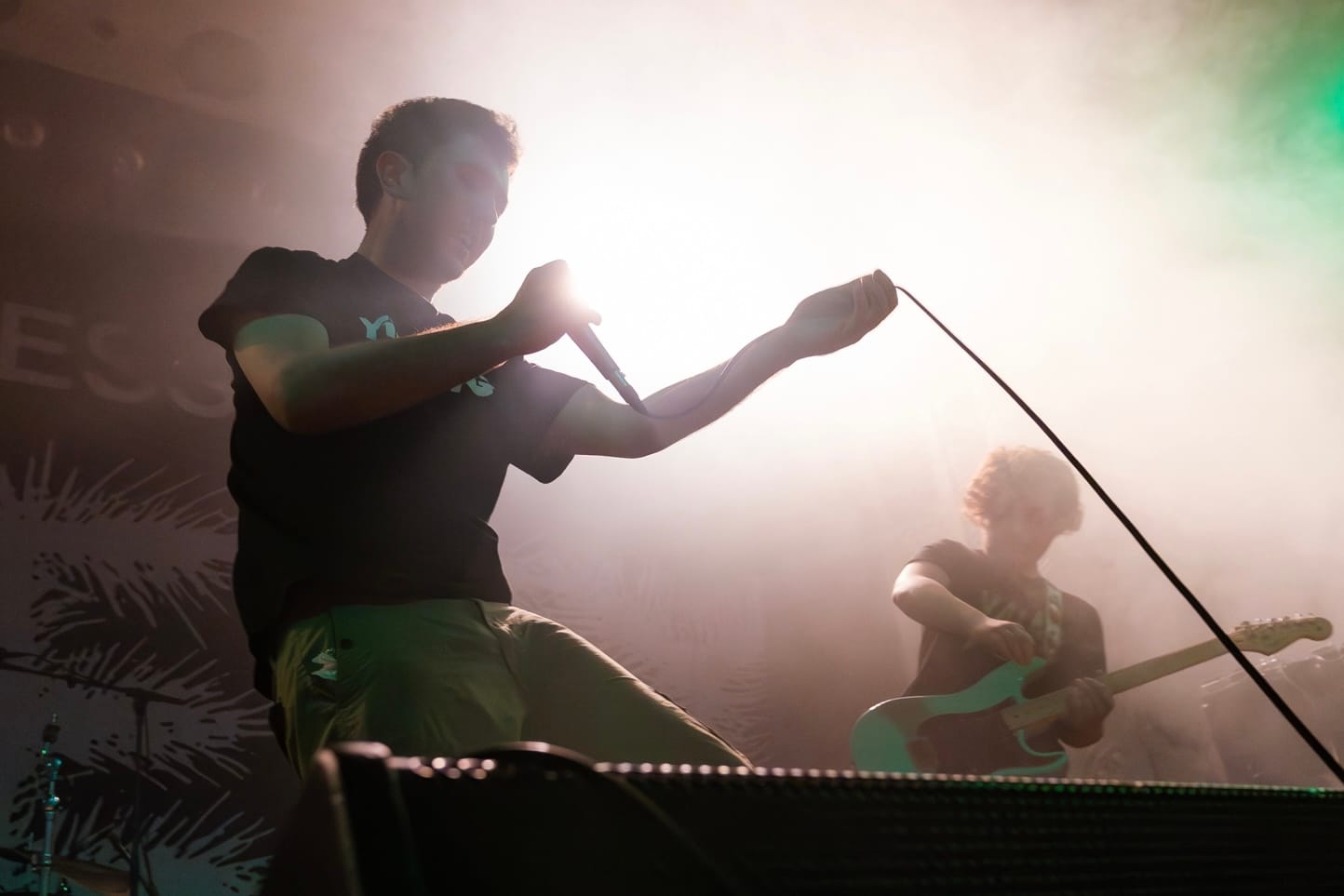
If the name Enola Gay doesn't sound familiar, you might want to make that checkup with the doctor you've been putting off. I'm not saying they're a household name here in the US (at least not yet, although next month's US tour might make some inroads there), but I did mention them like, a week ago. Although with the state of the world today and the way the news cycle works, that might as well have been 4 months ago, so I get it.
Speaking of paying attention to the world around you, I recently did an interview with Enola Gay and I gotta say...they really put a lot of thought into it. Not that I expected anything different - anyone familiar with their work knows the musical and lyrical depth they display - but it's always nice when you can tell the subject of your interview put honest to goodness time and effort into their answers.
As a refresher, here's some background on the band:
Belfast-based Irish noise punk mob formed in late 2019. Venomous hip-hop-inspired vocals that are as uncompromising as the guitars are unforgiving, layered on a rhythm section that draws as much from left-field electronica and techno as it does from post-punk heroes of the late 70s. Enola wasted no time in establishing themselves as one of the next unique punk voices, having been listed in both NME and Rolling Stone's lists of acts to define 2022 which they lived up to by headlining festivals and festival stages. Enola’s March 2024 US tour follows the continuation of their course for world domination after their debut US appearances at Chicago’s Metro supporting Viagra Boys and Riot Fest where Jehnny Beth appeared for guest vocals while also sharing the stage with Death Grips, Queens of the Stone Age and The Cure. Enola have also appeared on Jehnny Beth’s TV series Echoes.
After releasing their acclaimed debut EP Gransha, they certified themselves as one of the hardest working bands by selling out their debuting 32-date UK Tour. Over the summer NME quoted them as being “one of the most-booked new acts for European festivals”, making them the most-booked New-Irish band of 2022, disappointing only those turned away due to tents and stages breaching capacity.
Having experienced them playing live both in a 1,000 capacity club and then again the next day onstage during a festival, I can attest to all of that being 100% true. So let's do a little Q&A with the band to get to know them a bit better before their upcoming US tour dates.
312 Noise: The name of the band (Enola Gay) is for the first aircraft to drop an atomic bomb in warfare. How'd you settle on that as a band name? Did you have any hesitation knowing it would be difficult to Google the band name on its own?
Enola Gay: The name originates from my childhood. When I was a kid my mum would drive me to primary school and she had this 80s mix tape. OMD’s 'Enola Gay' would always come on and I would always skip to it – for what I thought was a very uplifting and joyous synth line. It wasn’t until I was older that I found out what Enola Gay actually was. The dichotomy of this perky pop song confessing such tenebrous social commentary about one of mankind’s biggest atrocities really struck me. It’s not just an anti-war statement, it’s also about being more conscious. That OMD track has been used in adverts for TV broadband which and I believe, not only undermines what happened, but also dilutes art with a message; taking things on a surface level for entertainment purposes the way I first did as a naive of 7 yr old. It’s that conflict on an emotional and visceral level that has worked its way into our music time and again- motivating us as songwriters to seek deeper meanings with more nuance.
Regarding the Google thing: I think it’s a good thing if people Google our band name and inadvertently learn more about the tragic nature of war. We’ve been surprised when a lot of people have asked us what the name means and never knew about the plane.
312: Political activism and social awareness are strong themes with the band, both in your lyrics as well as your posts on social media. Is that something that's always been a priority to the band or something that crept into your music over time?
EG: Art needs to be an extension of who you are and political struggles has been engrained in Irish culture for centuries. Ireland historically has suffered from British colonialism, with The Trouble’s in Belfast taking place until 1997, kind of. We come from the ‘Ceasefire Babies’ generation, born during The Good Friday Agreement which, was written ‘effectively’ end The Troubles in the North, but the war hasn’t ended. How could it have when remnants are still very much felt in the North? There’s a lot of healing still taking place from generational trauma in the form of alcoholism, suicide, identity erosion and political parties such as the DUP. While we didn’t grow up during The Troubles, there were still shootings and blockades happening literally as we were being born. Someone literally got shot outside the hospital I was born in as my ma was in labour.
Music serves as escapism for many people, particularly young people and that is why it is such a big part of Irish culture and why social and political awareness is an attribute of our band.
Also, we know a lot of people call it Northern Ireland but that’s a British colonialist concept we reject, it’s the North of Ireland.
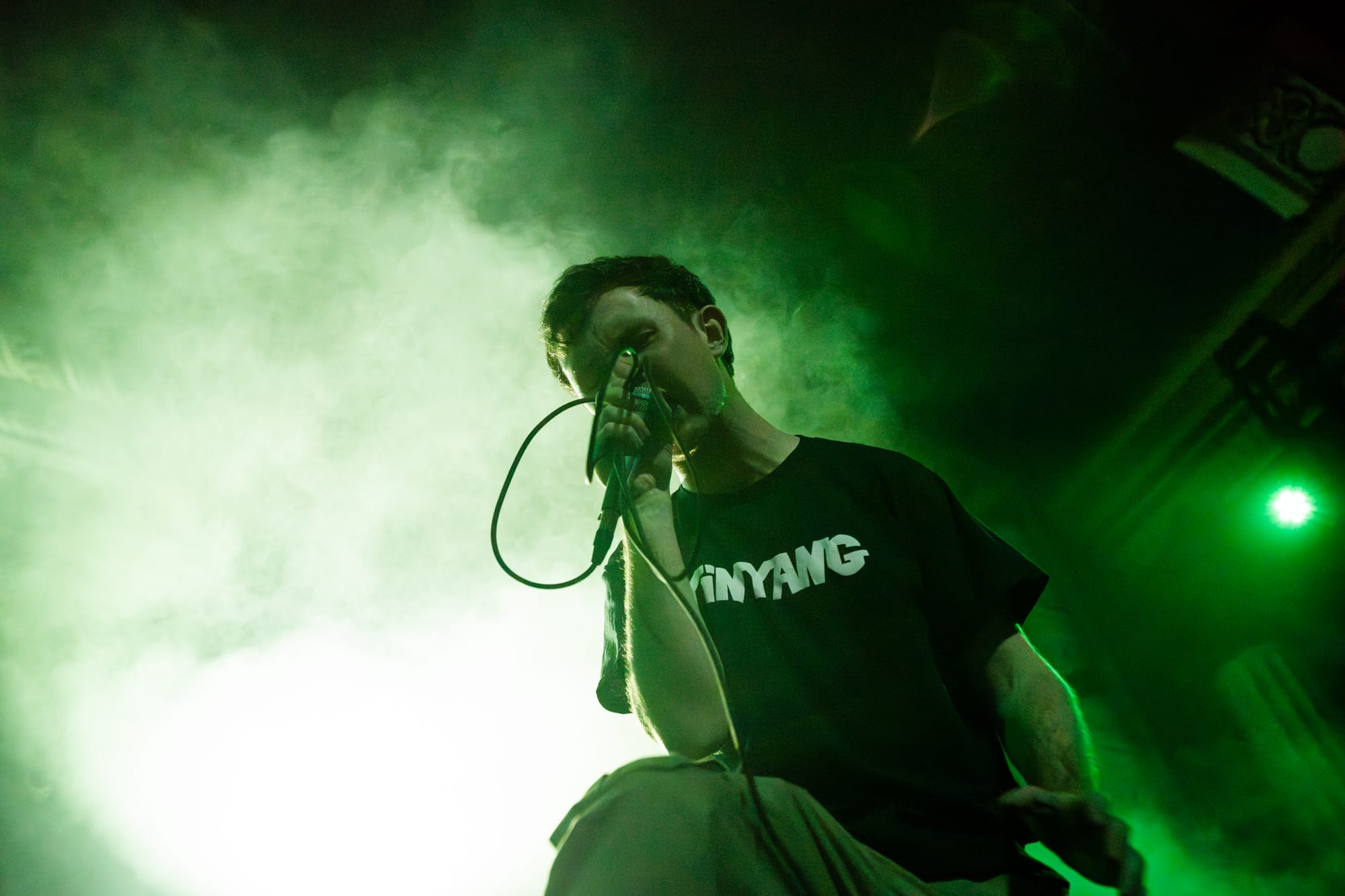
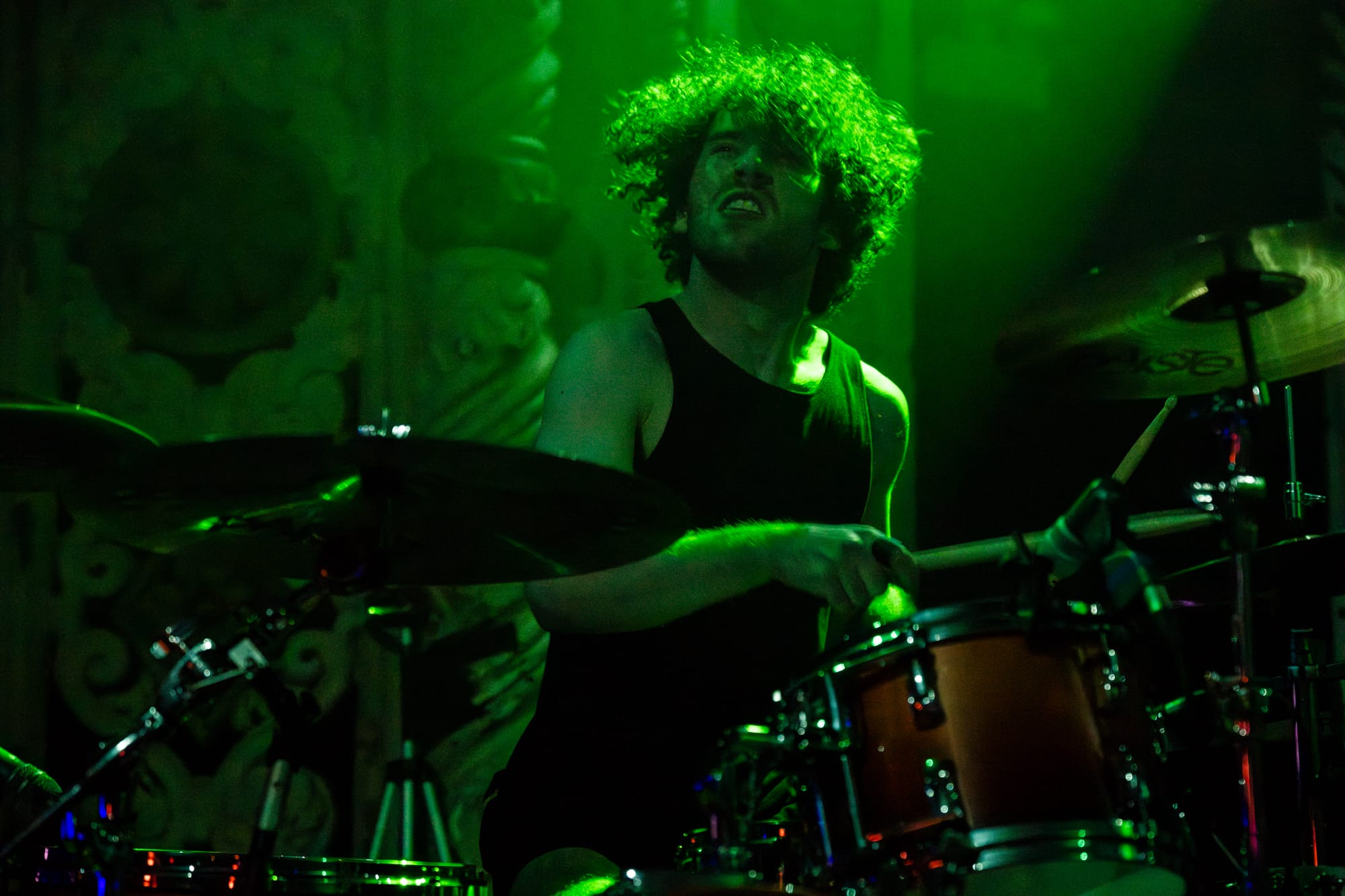
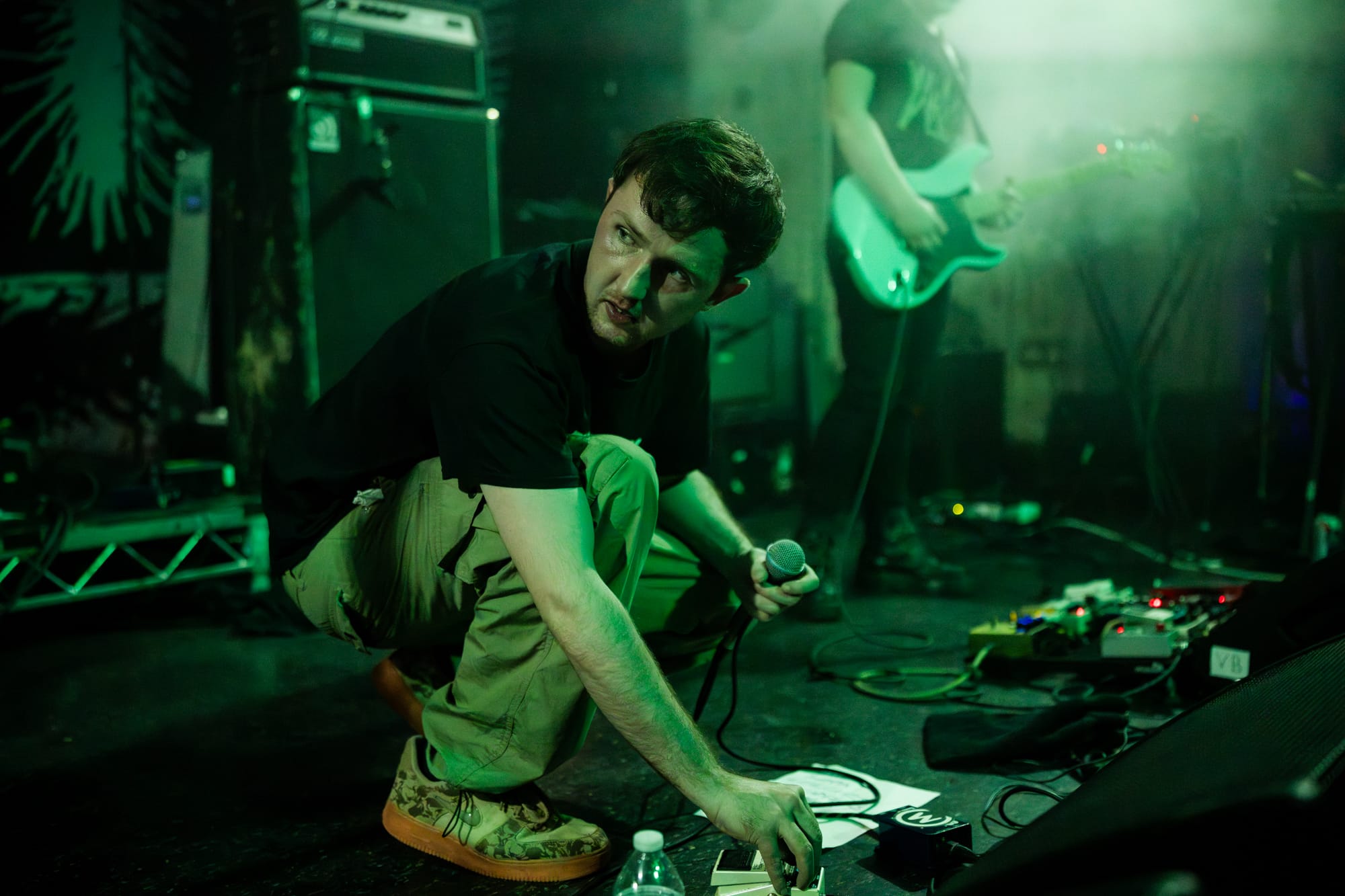
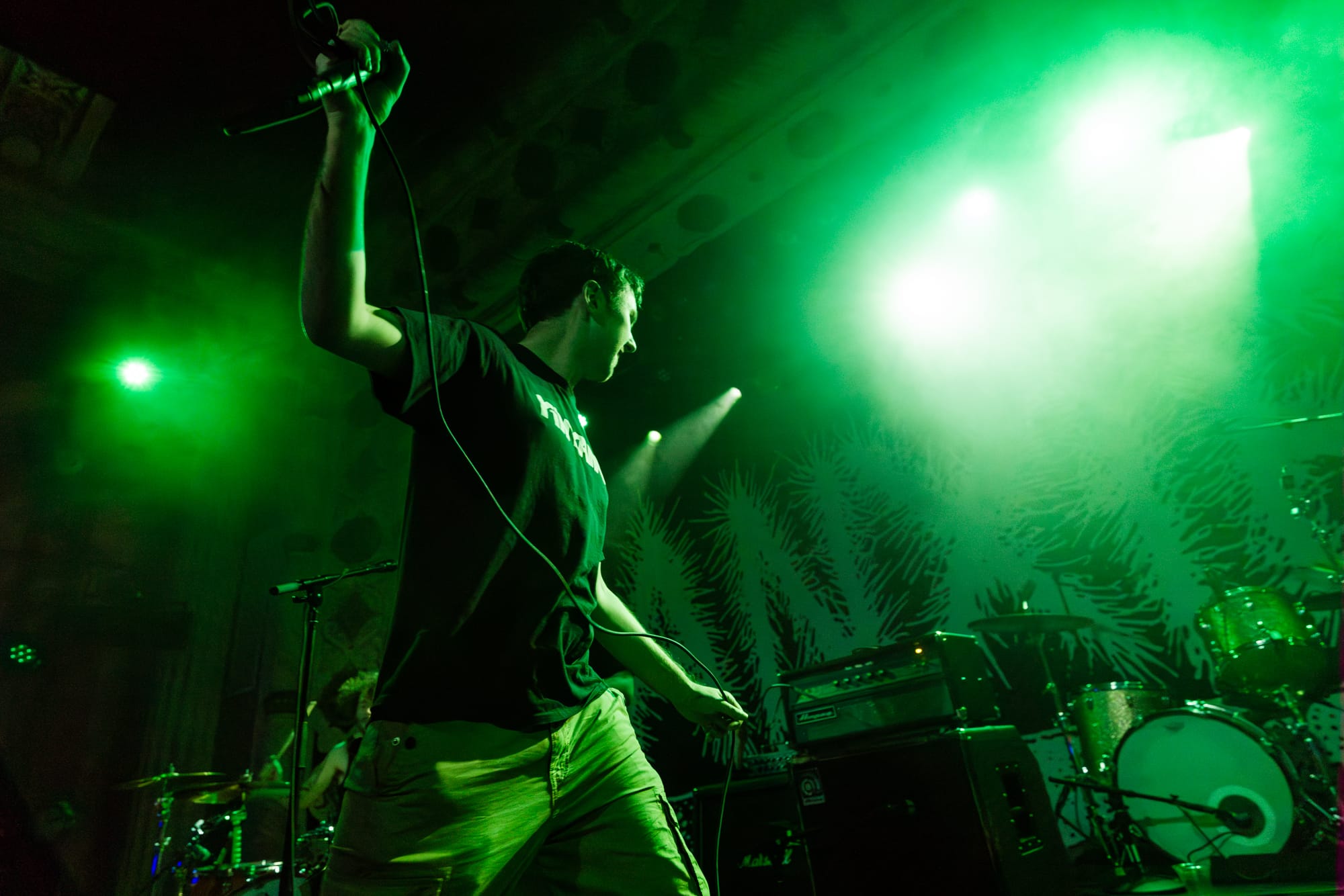
312: How did the members of your band initially meet? Did you all share similar musical influences, or do each of you bring something a little different to the table taste-wise?
EG: Fionn Reilly (vocalist) and I met at a Chemical Brothers concert in Belfast back when we were wreck-heads who just went out raving and partying for days on end because we both felt pretty dejected. It wasn’t until years later that we craved something more tangible than pills. We caught wind of the of post-punk resurgence and thought “we could do that” and about a month into it came ‘Sofa Surfing’. Instantly we felt we had something special. Adam Cooper replaced our first bass player and Luke Beirne replaced our 4th drummer, finding the right lineup took time.
We have an eclectic well of influence but it mostly overlaps. We all love SWANS, Death Grips, electronic acts such as Aphex Twin and Flying Lotus, rappers like MF DOOM and Danny Brown but there could be the odd act only one or two people in the group really listens to like me with Dead Kennedys or Fionn with a lot of his Irish folk like Luke Kelly. Irish folk music is punk in its purist form, by and for the underdogs of society.
312: There's never been a time in history where bands have had greater access to the kinds of tools they need to put out and distribute their own music than today. But that doesn't mean it's any easier for bands to break through. In fact, that just provides more competition.
EG: We were more concerned with oversaturation rather than competition. The post-punk umbrella almost drove itself into the ground, making it the new indie. That kinda thing can turn people off you before they’ve even listened to you and I get it. The bands worth their salt will surpass it though. I think we’re more punk than post-punk these days anyway.
312: One of the biggest music markets in the world is literally across an entire ocean. What's the biggest challenge when it comes to trying to cultivate an audience in the US?
EG: We didn’t find it difficult at enticing the crowd in Chicago once we got on stage. We know Americans love the Irish and hardcore music so we were adamant that if we maintained the energy and kept it lit that the audience would reciprocate.
Most US punk music we’ve heard seems to be very power-chord oriented whereas we have a more noise shoegaze approach that replicates synths and textures heard in techno and hip-hop tracks. So, there are certain tracks of ours we knew would go down a storm because we don’t know any American bands doing it. We’re buzzing to play a full hour in the States. We were told early on by a couple from Nashville who stumbled across our second gig that we would do well in America because our tracks are very rhythmic and bass oriented.
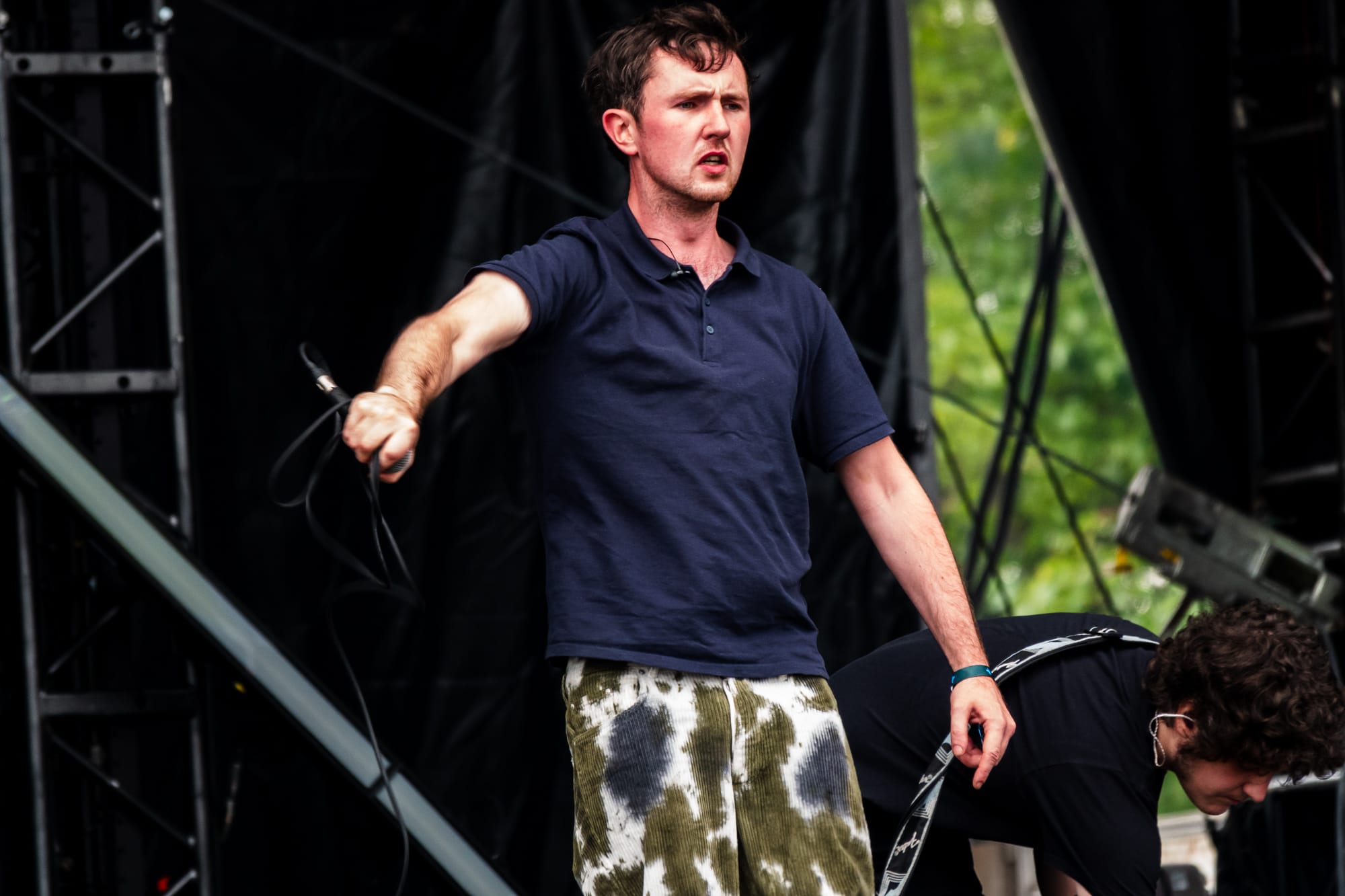
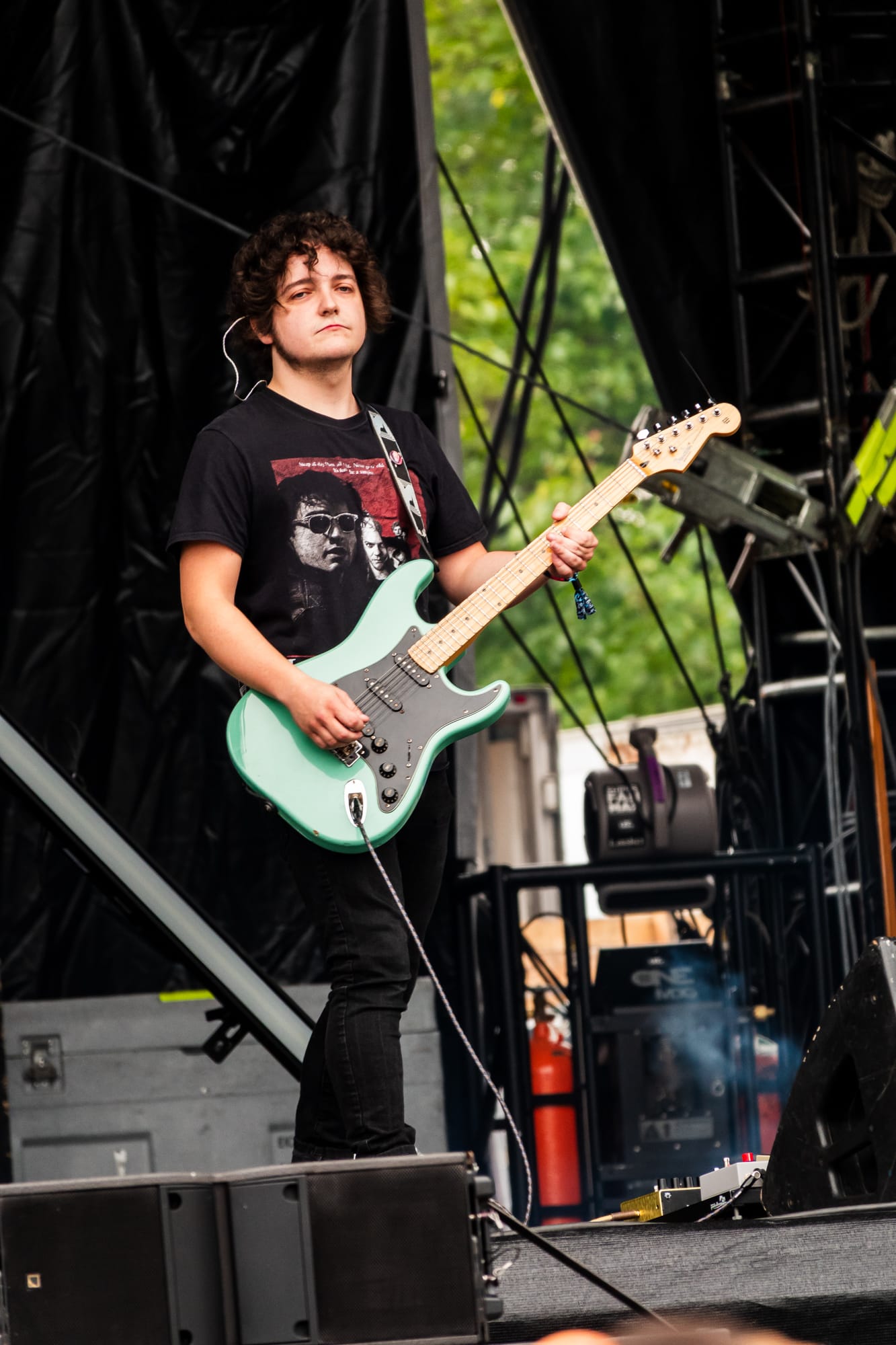
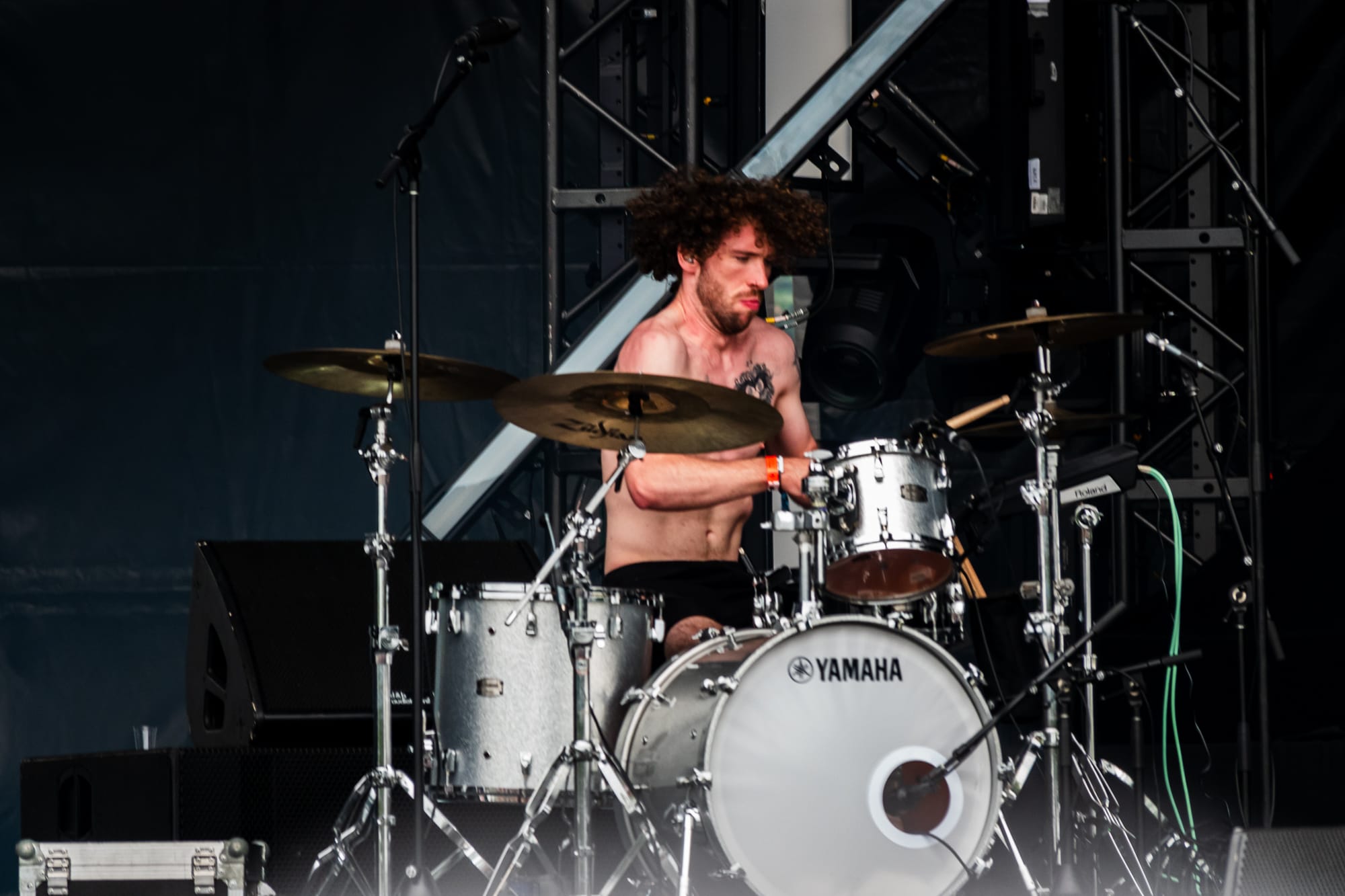
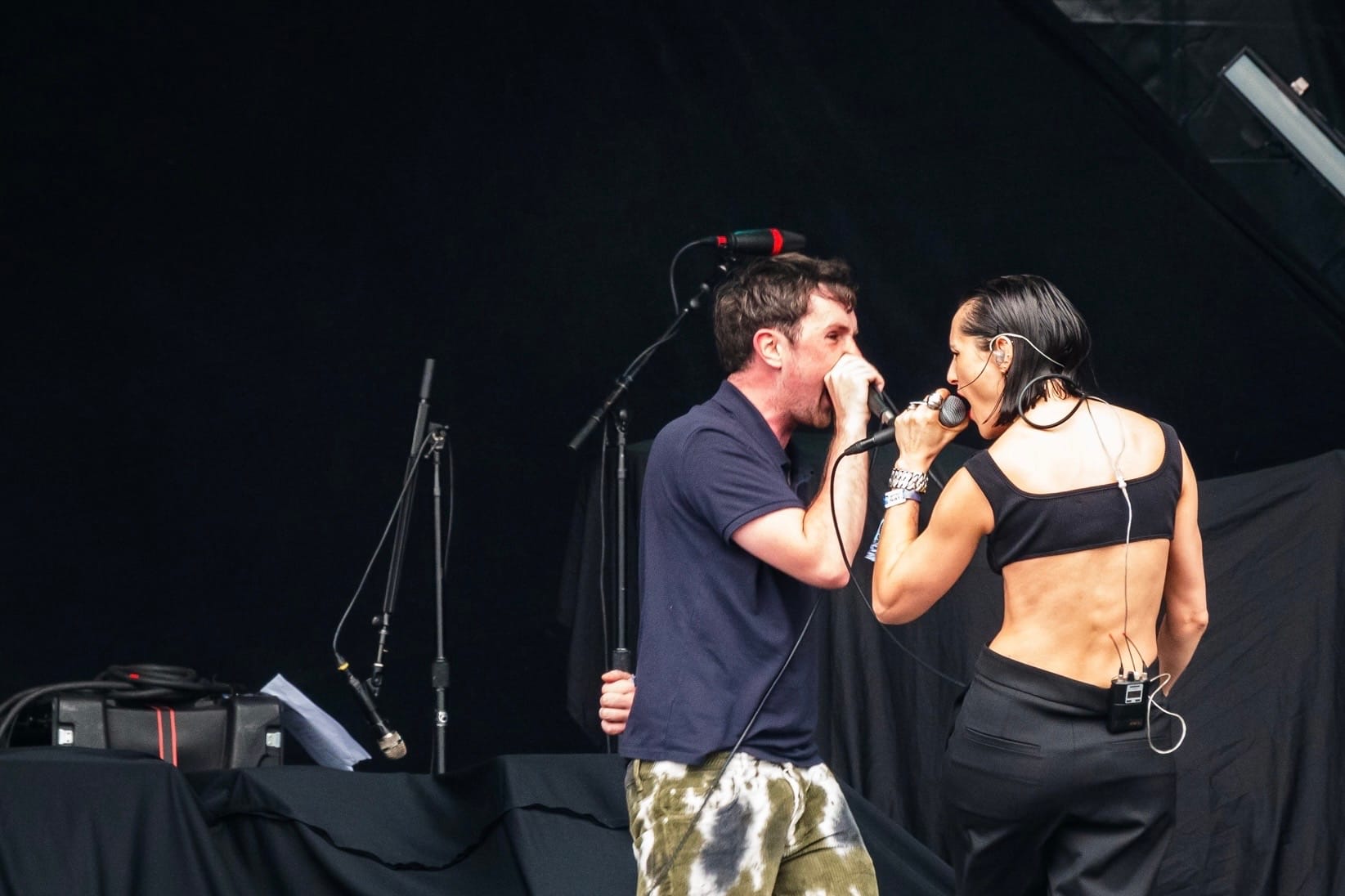
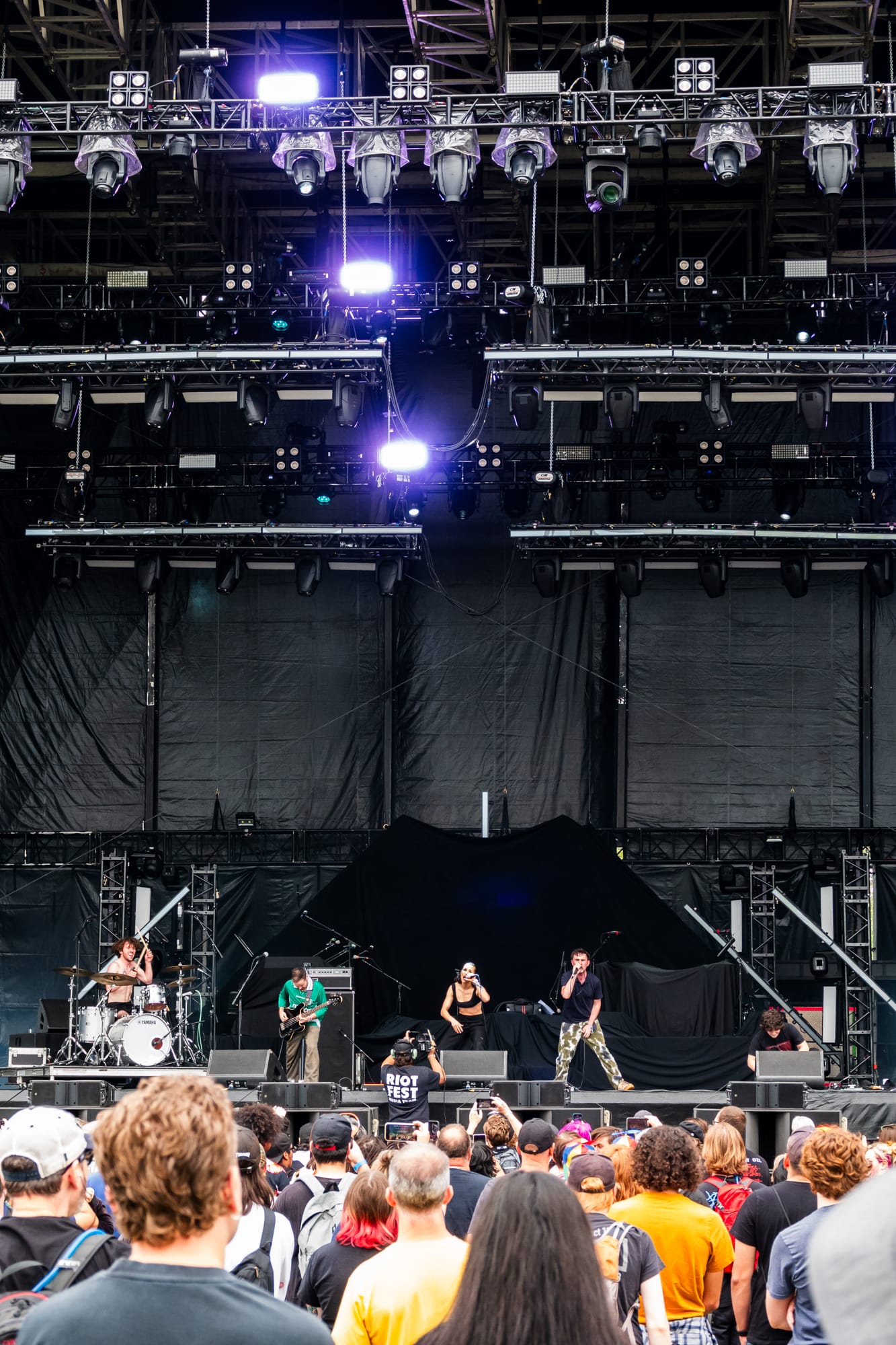
Enola Gay at Riot Fest 2023
312: As a follow-up to that, what are the absolute most useful things your fans in the US can do to help spread the word about Enola Gay?
EG: Besides of course sharing and reposting our music, they could pass us on to local DJs and zines or fire them our way via socials and email: enolagayband.official@gmail.com. Our fans made a fan page for us on Facebook called Sofa Scrolling, they could invite their mates to that too.
312: Favorite US city you've played in?
EG: We’ve only ever played Chicago but we’ve been in a few states… Chicago is a part of the band’s history; it was a real milestone for us. We played Riot Fest last year after opening for Viagra Boys in The Metro the night before. Both shows were class craic, sharing the stage with Death Grips and Queens of the Stone Age felt like such a power move for our debut. We’ve been massive fans of Jehnny Beth and her previous band Savages for years so about 20mins before we went on we asked her to join us on stage to sing Scrappers without hesitation she said “fuck yeah”. That was one of those ‘once in a lifetime moments’ which we’ve actually been able to do twice since and probably will whenever our paths cross again
Imposter syndrome lasted until we started playing and we watched the crowd go buck mad and thought “right enough, this is why we’re here."
312: Who are some bands that you would say were influences/inspirations for you that might surprise your fans to hear?
EG: Already sort of touched on this but Irish folk, from Luke Kelly to something more abstract like Lankum. Early-mid 00’s pop has loads of sick bass and beat based tracks with great flows; Nelly Furtado comes to mind. Fuck just lifting from one genre, write me a fierce screamer like Azealia Banks’ 212 with guitars. We’ll lift from anything really. We played a festival with Jockstrap and heard 50/50 for the first time and immediately we agreed to write a tune like that so when we got home, we did.
We plan to even incorporate film scores into our production. Composer Mark Korven (The Lighthouse & The VVitch) is a genius- Mica Levi who scored Under The Skin too.
312: What's your favorite song to play live?
EG: Either 'Figures' or 'For God & For Ulster'. Similar tracks in vibe which both fell out of the sky in a day. 'FG&FU' is special because it’s about our thoughts on the 12th of July holiday that’s used by Loyalists (right-wing Unionist extremists) to excuse a day of hating Irish nationalism and republicanism. We love educating people on Irish history. With many Americans having Irish descendants, they should really listen to what we’re saying in the track, that and 'PTS.DUP' especially. 'Scrappers' does ignite some feral shit in people anytime we play it though.
312: It doesn't necessarily have to be the "biggest" or "most violent" (although it certainly can be), but when I say "describe a memorable mosh pit from one of your live shows", what's the crowd that immediately pops into your head? And why?
EG: Hard to choose. I could say something like one of our bigger festival appearances but when I think of any of them everyone just looks like ants. From the get-go our gigs were quite caustic, our 3rd ever show we headlined a Belfast nightclub typically used for raves. We played for 30mins and by the end we were barred for life and an ambulance was outside because someone cracked a rib. Paris is always mad gear, first time we played there we had people jumping off the balcony despite the amps cutting out- nobody gave a shit and we were too caught up in it to really notice. This rap/hardcore fest Outbreak was crazy, we sat chatting to Earl Sweatshirt after about Irish history.
312: After your current dates in March are finished, what should fans expect from you all the rest of 2024? Anything you can tell us about, or is it all hush hush for the time being?
EG: More music and festivals however, we have a special collaboration in the works that’s gonna make everyone sit up and pay close attention.
312: Best meal you've had in the US while on tour?
EG: Breakfast at Ted’s Snackshop in Evanston.